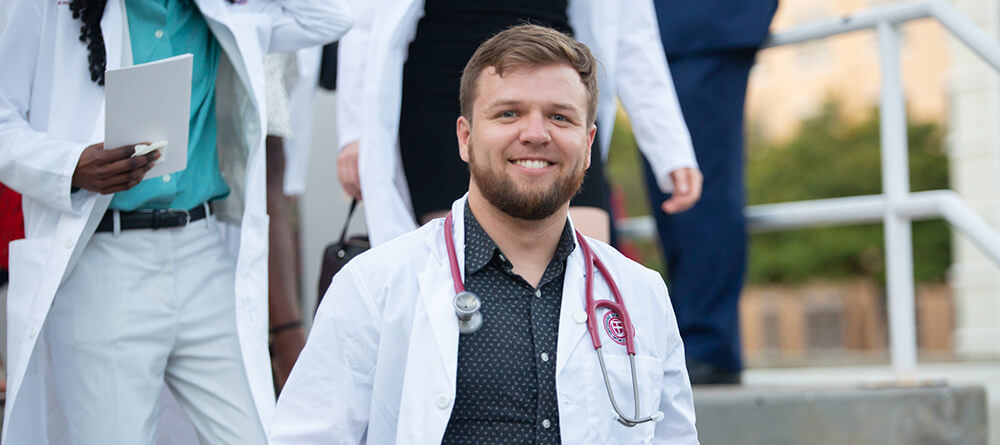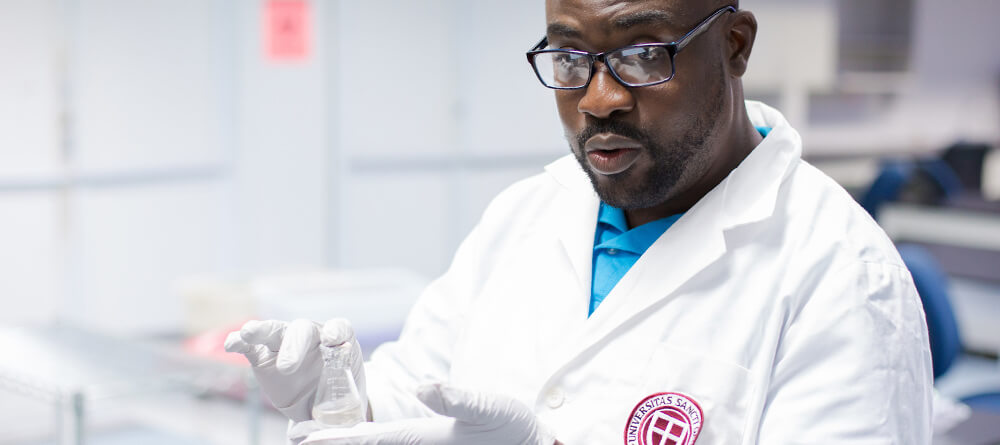Internal medicine is a great specialty for physicians who want to treat a wide range of conditions and develop long-term relationships with patients. For med school graduates who secure an internal medicine residency and then later complete a fellowship, this field is a stepping stone to an array of different career paths.
What are subspecialties of internal medicine? You may be surprised to find there are more than 20 internal medicine subspecialties that aspiring physicians can choose from.
23 Internal medicine subspecialties future physicians should consider
While a general internist sees adult patients of all types and treats numerous conditions, subspecialists focus on specific types of diseases, organ systems, or patient populations. To become a board-certified subspecialist, you must complete the appropriate internal medicine fellowship following residency and pass the corresponding American Board of Internal Medicine(ABIM) certification assessment .
Note that, unless specified otherwise, each of the career descriptions below is informed by the Fellowship and Residency Electronic Interactive Database (FREIDA) Specialty Guide from the American Medical Association (AMA). Information about specific certification requirements—a valid medical license, demonstrated clinical competence, and a passing score on the appropriate exam are standards for each subspecialty—are from the ABIM as well as the American Board of Allergy and Immunology (ABAI).
1. Adolescent medicine
Physicians who subspecialize in adolescent medicine work with patients who are transitioning from childhood to adulthood. While this may sound similar to pediatrics, adolescent medicine specialists don’t work with children until they’re around the age of 10 or 11. They address adolescents’ primary care needs and also provide care related to reproductive health, eating disorders, chronic illness, substance misuse, and sports medicine.
- 24 months of fellowship training
- Existing ABIM certification in internal medicine or a subspecialty
2. Adult congenital heart disease
Adult congenital heart diseasesubspecialists are uniquely qualified to care for patients who have defects in their heart or blood vessel structures. These physicians often coordinate with numerous other health care professionals to provide long-term care for the individuals they treat.
- 36 months of fellowship training in cardiovascular disease or pediatric cardiology
- 24 months of fellowship training in adult congenital heart disease
- Existing ABIM certification in cardiovascular disease
3. Advanced heart failure and transplant cardiology
Practicing advanced heart failure and transplant cardiology requires in-depth knowledge and unique skills to properly care for patients who have gone through transplant surgery or are still awaiting an operation. It involves managing advanced or complicated heart failure beyond the scope of what’s typical for general cardiologists. These subspecialists may also act as consultants for other physicians working with heart-failure patients.
- 36 months of fellowship training in cardiovascular disease
- 12 months of fellowship training in advanced heart failure and transplant cardiology
- Existing ABIM certification in cardiovascular disease
4. Allergy and immunology
Physicians who specialize in allergy and immunology are trained specifically to diagnose, treat, and manage health issues like asthma, immunologic disorders, and allergies—including cases involving adverse reactions to foods and insect stings. Allergist/immunologists see a wide variety of conditions and work with patients of all ages. These physicians can choose to pursue careers that are primarily clinical in nature or focus more on research.
- 24 months of fellowship training in allergy and immunology
- Existing certification in internal medicine, pediatrics, or a subspecialty of either field through the ABIM or the American Board of Pediatrics
5. Cardiovascular disease
Known as cardiologists, physicians who specialize in cardiovascular disease are experts in diseases of the heart and blood vessels. Physicians in this field, which is one of the most well-known internal medicine subspecialties, manage conditions like coronary artery disease, heart rhythm abnormalities, and heart failure. While cardiologists work to treat and manage existing conditions, they also focus on preventive measures.
- 36 months of fellowship training in cardiovascular disease
- Existing ABIM certification in internal medicine
6. Clinical cardiac electrophysiology
Cardiologists who subspecialize in clinical cardiac electrophysiology treat patients who have complex rhythm disorders. It is common for these physicians to make use of implantable electrical devices, such as pacemakers, as well as imaging and medications.
- 36 months of fellowship training in cardiovascular disease
- 12 months of fellowship training in clinical cardiac electrophysiology
- Existing ABIM certification in cardiovascular disease
7. Critical care medicine
Critical care physicians are experts when it comes to diagnosing and treating incredibly ill or injured patients, which can include those who have experienced trauma. Many of these physicians focus on a particular patient population or type of condition, though this is not always the case. Much of the work critical care physicians do takes place in intensive care units (ICUs). While some pursue critical care as a standalone subspecialty, it’s more common for physicians to couple this field with a focus in pulmonology or nephrology.
- 24 months of fellowship training in advanced internal medicine, or an internal medicine subspecialty coupled with 12 months of fellowship training in critical care medicine, or 24 months of fellowship training in critical care medicine
- Existing ABIM certification in internal medicine

8. Endocrinology, diabetes, and metabolism
More commonly referred to as endocrinologists, internists who subspecialize in endocrinology, diabetes, and metabolism work with patients who are experiencing endocrine gland issues, which can include hormonal and metabolic disorders. Lab tests play a huge role in helping these physicians make appropriate diagnoses, so they typically have very extensive research backgrounds.
- 24 months of fellowship training in endocrinology
- Existing ABIM certification in internal medicine
9. Gastroenterology
Gastroenterologists, sometimes called GIs for short, address conditions that affect the digestive organs. Some commonly treated conditions include ulcers, liver disease, and abdominal pain. While gastroenterology is considered a medical specialty, these physicians also perform a fair number of procedures.
- 6 months of fellowship training in gastroenterology
- Existing ABIM certification in internal medicine
10. Geriatric medicine
While general internists work with patients of all ages, geriatricians focus solely on elderly individuals. They’re deeply knowledgeable about the aging process as well as the types of medical complexities aging patients typically face. Their work also involves communicating with family members and caregivers to ensure their patients’ needs are met across a variety of settings.
- 12 months of fellowship training in geriatric medicine
- Existing ABIM certification in internal medicine
11. Hematology
This internal medicine subspecialty focuses on blood disorders, such as hemophilia, anemia, and leukemia. Hematologists frequently examine specimens under microscopes, analyze lab results, and rely on their scientific knowledge to diagnose and treat different conditions. Depending on the patient and the condition, a hematologist might work with an individual on a short- or long-term basis.
- 24 months of fellowship training in hematology
- Existing ABIM certification in internal medicine
12. Hospice and palliative medicine
Physicians who practice hospice and palliative medicine focus on end-of-life care, working to relieve discomfort for patients with life-threatening illnesses. They work in conjunction with a care team to address the physical, psychological, social, and spiritual needs of patients and their families. Collaborating with other physicians to manage symptoms is also common.
- 12 months of fellowship training in clinical hospice and palliative medicine
- Existing ABIM certification in internal medicine or a subspecialty
13. Hospital medicine
This is a relatively new specialty that entails caring for hospitalized patients. As the American College of Physicians (ACP) explains, physicians who specialize in hospital medicine have highly specialized knowledge in managing very ill patients and are responsible for care coordination. While many hospitalists are generalists, some also choose to focus on certain procedures, treatment types, or even the times of day they work.
Certification requirements (this is a focus acquired through a maintenance of certification program rather than a traditional certification):
- 36 months of unsupervised inpatient care practice
- 1,000 inpatient encounters per year for three years, or practice involving 50 percent or more nonclinical time devoted to improving patient care as well as 250 patient encounters per year for three years that comprise at least 75 percent of clinical activity
- Existing ABIM certification in internal medicine
14. Infectious disease
Infectious disease specialists focus their practices on diagnosing and treating diseases caused by microorganisms, such as hepatitis and human immunodeficiency virus (HIV). They work to identify the cause of an infection and help to craft an effective treatment plan. Because the field is so broad, these physicians can go into clinical practice, public health, epidemiology, and more.
- 24 months of fellowship training in infectious disease
- Existing ABIM certification in internal medicine
15. Interventional cardiology
Unlike general cardiologists, physicians who go into interventional cardiology focus on using specialized imaging and other diagnostic techniques to evaluate the cardiovascular system and related functions. These physicians diagnose and address heart diseases that typically require treatments using a catheter—a long, thin tube that’s inserted into the heart—including coronary artery disease.
- 36 months of fellowship training in cardiovascular disease
- 12 months of fellowship training in interventional cardiology
- Existing ABIM certification in cardiovascular disease
16. Medical oncology
Medical oncologists are most commonly known as physicians who treat cancer, but they also deal with tumors that are noncancerous. In addition to administering therapies, they also work with surgeons and other physicians to treat cancers. Medical oncologists typically serve as cancer patients’ primary points of contact, so they often develop very close relationships with those they treat.
- 24 months of fellowship training in medical oncology
- Existing ABIM certification in internal medicine
17. Nephrology
Internists who go on to specialize in nephrology focus their practices on treating kidney disorders. This includes complex conditions that require dialysis, a treatment that helps to filter toxins out of blood when the kidneys aren’t functioning. They work with patients who have mild conditions as well as those with advanced diseases that may eventually require a transplant.
- 24 months of fellowship training in nephrology
- Existing ABIM certification in internal medicine

18. Neurocritical care
According to the Neurocritical Care Society, this field entails managing patients with life-threatening neurological illnesses and post-neurosurgical complications. These issues can range from nerve diseases to brain trauma. Neurocritical care subspecialists often work in specialized intensive care units to meet their patients’ unique needs. Note that while neurocritical care is considered an internal medicine subspecialty, it’s far more common to pursue this field after completing a neurology residency.
- 12 or 24 months (depending on the pathway) of fellowship training in critical care medicine
- 12 months of fellowship training in neurocritical care
- Existing ABIM certification in critical care medicine
19. Pulmonary disease
While some physicians choose to seek dual certification in pulmonary disease and critical care medicine, it is possible to specialize in both disciplines independently. Those who focus on pulmonary disease are experts in respiratory disorders, including asthma and pulmonary hypertension. Some physicians in this field focus their practices on interventional pulmonology, which involves performing a variety of procedures.
- 24 months of fellowship training in pulmonary disease
- Existing AGIM certification in internal medicine
20. Rheumatology
If you’ve ever heard of rheumatoid arthritis, then you might be able to guess that a rheumatologist is a physician who diagnosis and treats diseases that affect joints, muscles, and related tissues. These physicians need exceptional physical examination skills to make proper diagnoses. It’s also common for rheumatologists to serve as consultants for other physicians, including general internists.
- 24 months of fellowship training in rheumatology
- Existing ABIM certification in internal medicine
21. Sleep medicine
As experts in sleep disorders, sleep medicine specialistsleverage a variety of techniques and medications to diagnose and manage conditions like insomnia and sleep apnea. They have in-depth knowledge of the sleep and respiratory control centers as well as the ways in which changes in physiology can affect their patients. Physicians who pursue sleep medicine typically do so after completing a fellowship in pulmonology, but this isn’t a requirement.
- 12 months of fellowship training in sleep medicine
- Existing ABIM certification in internal medicine or a subspecialty
22. Sports medicine
Not to be confused with orthopedics, a surgical specialty, sports medicine deals with diagnosing and treating sport-related injuries using nonoperative techniques. They also work with patients to help prevent future injuries. While sports medicine physicians can choose to work in a traditional practice setting, some are employed directly by athletic teams.
- 12 months of fellowship training in sports medicine
- Existing ABIM certification in internal medicine or a subspecialty
23. Transplant hepatology
Physicians who pursue the transplant hepatology internal medicine subspecialty devote their careers to studying diseases that result in transplant surgery, meaning the diseases that affect the liver and other digestive organs. Their work involves both preoperative and postoperative care, so a solid knowledge of how to manage transplant-related complications is essential.
- 36 months of fellowship training in gastroenterology
- 12 months of fellowship training in transplant hepatology
- Existing ABIM certification in gastroenterology
Find your ideal internal medicine subspecialty
The choice between becoming a general internist and focusing on one of the above internal medicine subspecialties comes down to where your strengths and interests lie. Regardless of which route most piques your interest, you’ll need to graduate from medical school first. Start familiarizing yourself with what to expect during a Doctor of Medicine (MD) program by visiting our infographic “How Long Is Medical School? Mapping Your Medical School Education Journey.”
Ready to start your medical school journey?
Are you considering St. George’s University Medical School? If you need any more convincing, just reach out to some graduates or current students. They’re happy to tell you what their experiences were like.
If you feel like SGU could be the right medical school for you, take the next step. Continue your research by visiting our request information page.


